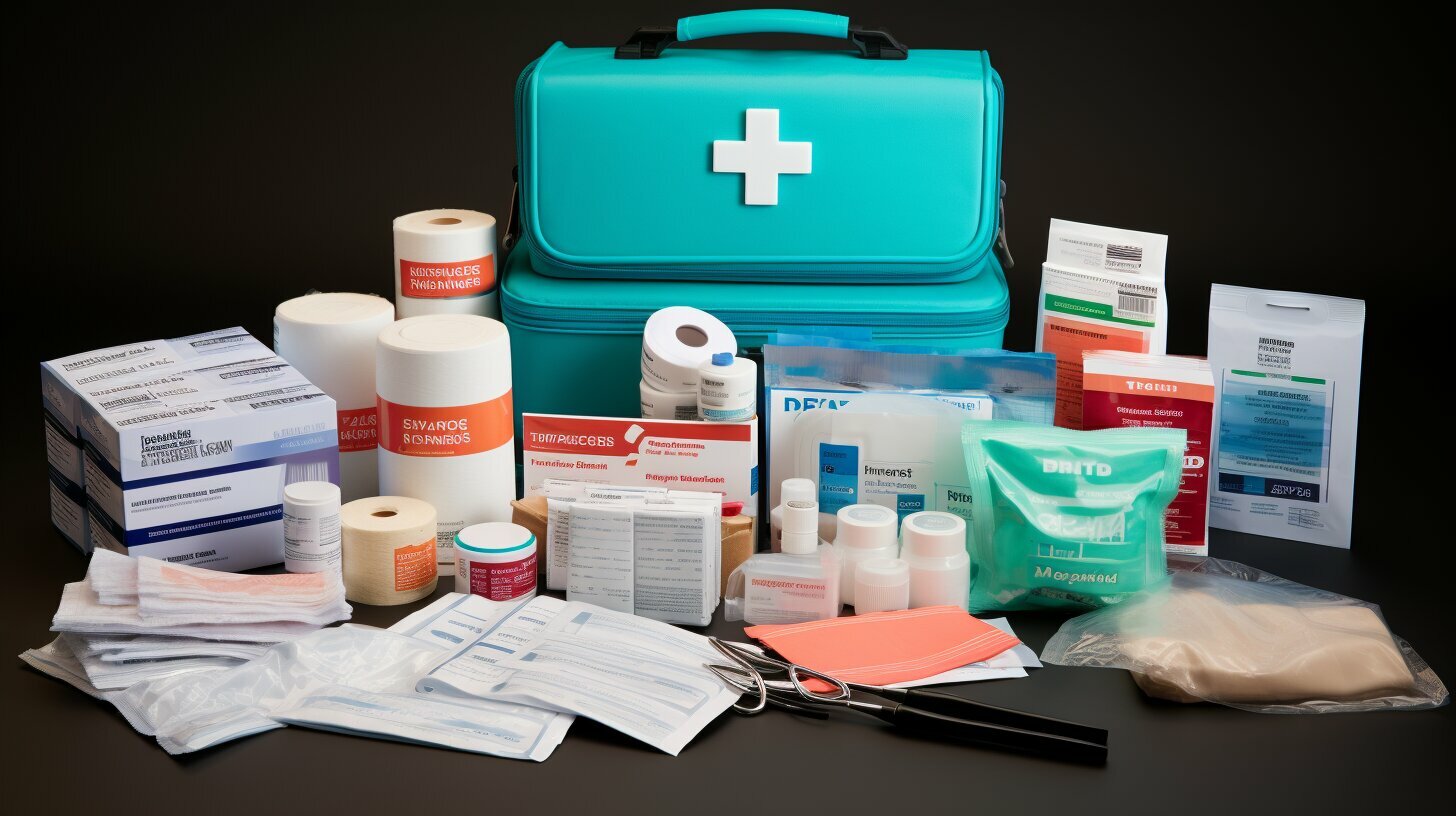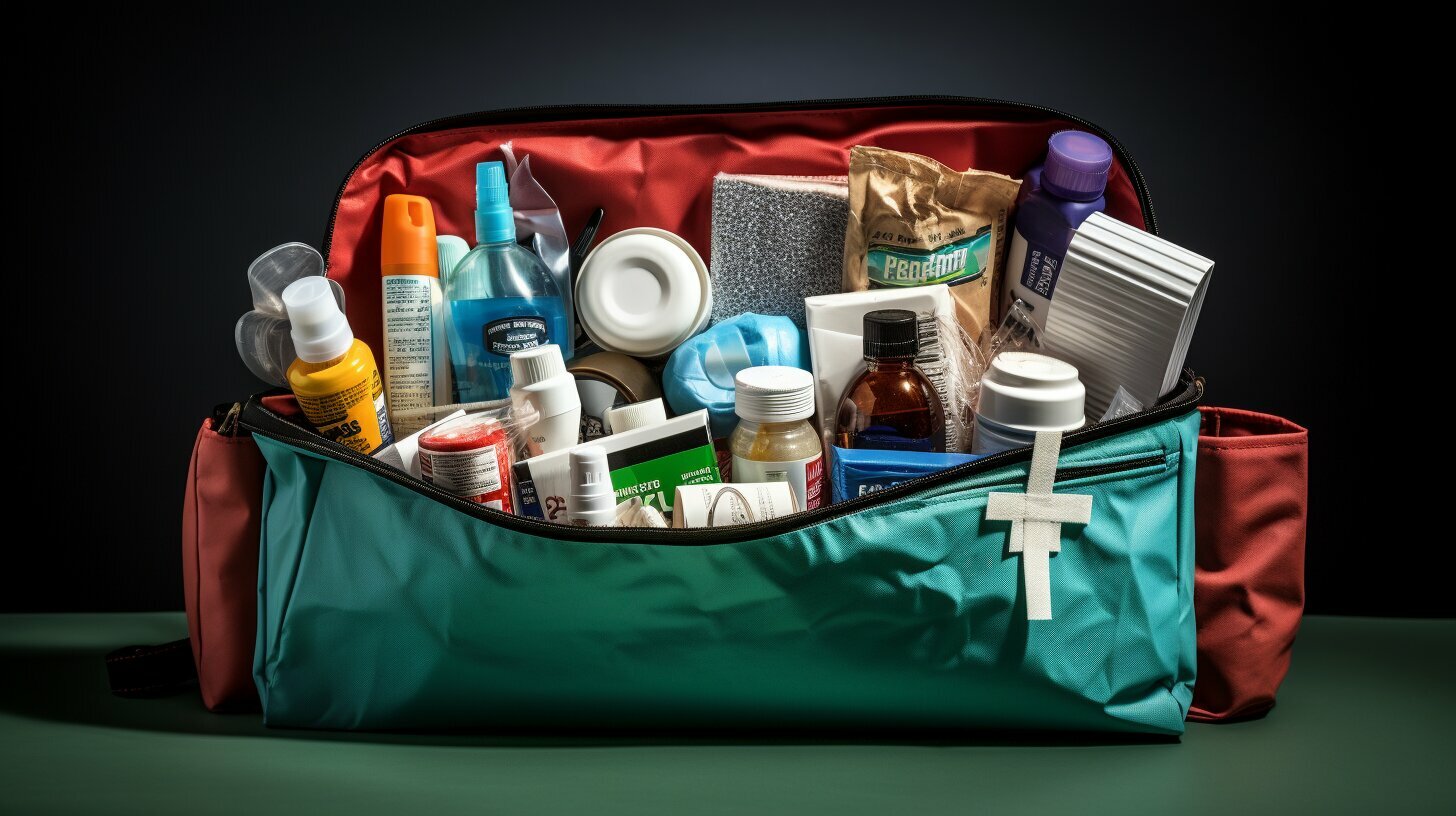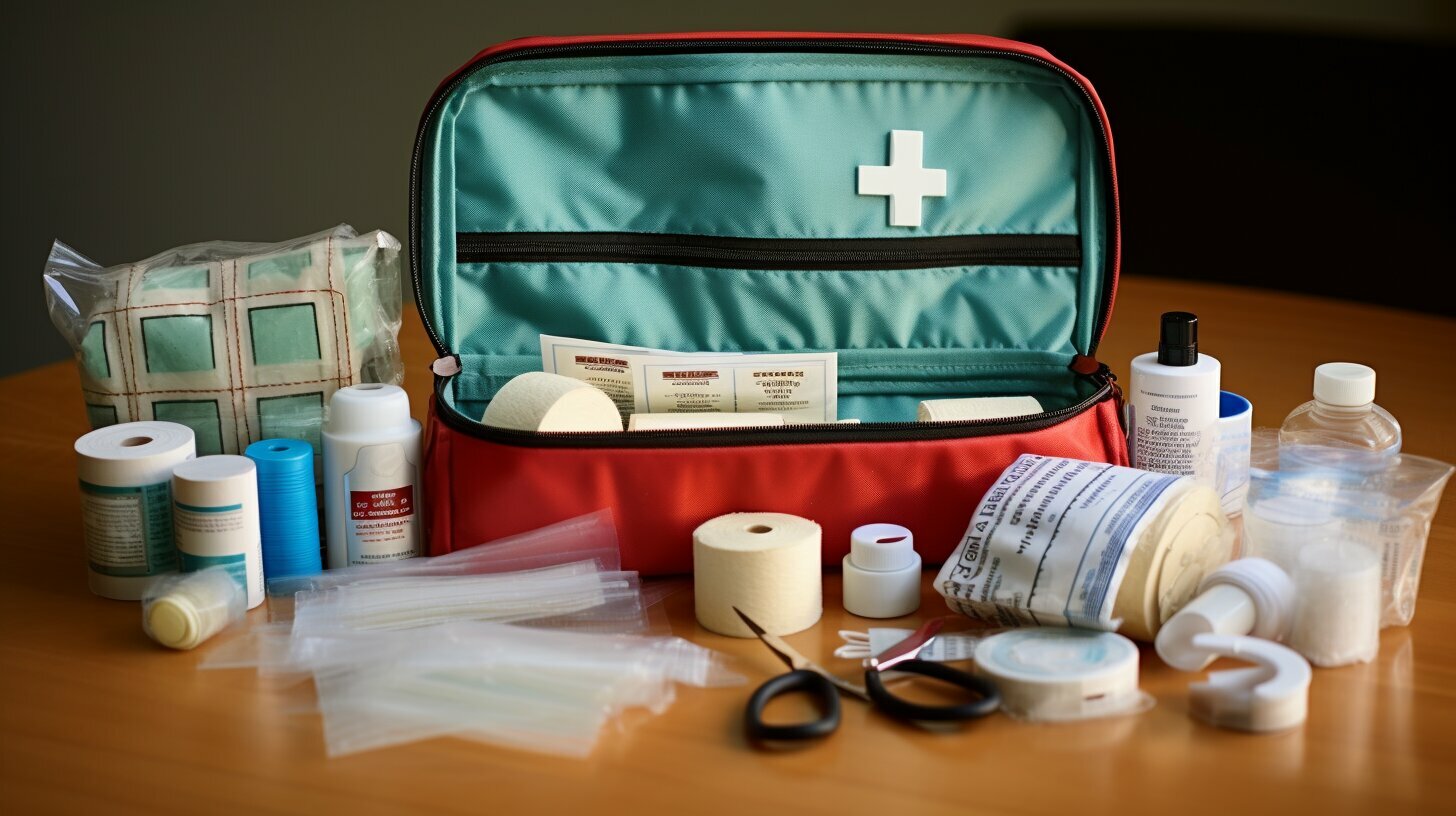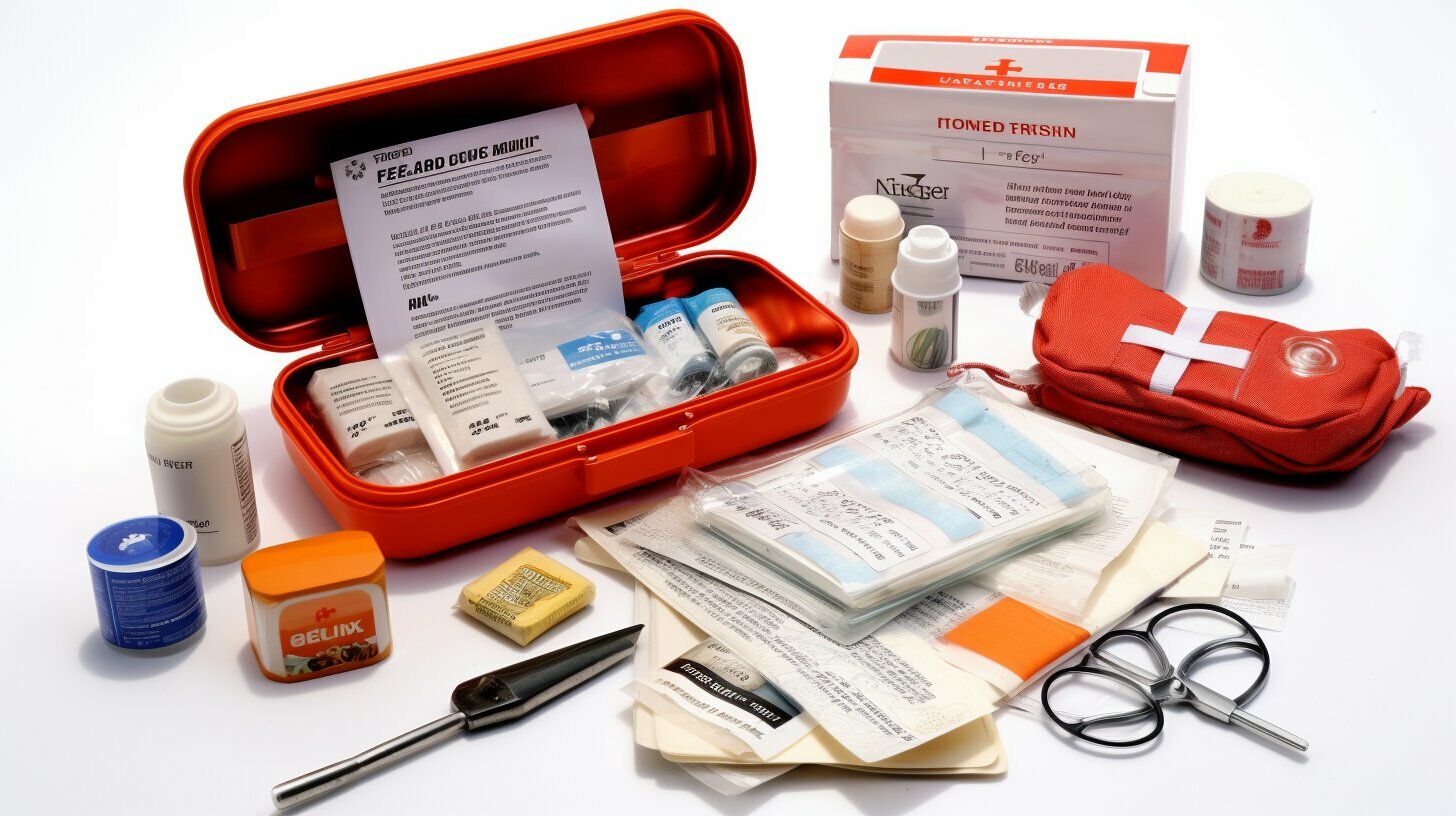First aid kits are crucial for seniors as they become more susceptible to injuries and health issues, making it essential to customize the kit to cater to their specific needs. Senior-friendly first aid kit supplies and senior-specific first aid kit items should be included to ensure their safety and well-being.
When assembling a first aid kit for the elderly, it is important to consider their medical conditions and any prescribed medications they may be taking. Basic first aid supplies for the elderly should include bandages, gauze, antiseptic wipes, pain relievers, gloves, scissors, and tweezers. These items are essential for treating minor injuries and providing immediate relief.
Seniors may also require specialized first aid items that are specifically designed to meet their unique needs. This includes shears for cutting clothing, butterfly closures for securing wounds, self-adhering bandages for easy application, transparent film dressings for protecting wounds, and non-stick gauze for gentle wound care.
In addition to basic and specialized supplies, it is important to include additional items in a senior’s first aid kit to prepare for emergency situations and disasters. These may include emergency phone numbers, medical history documents, flashlights, and prescription medications. Being prepared for unforeseen events is crucial for seniors’ safety and well-being.
Regular assessment and restocking of the first aid kit is equally important to ensure its effectiveness. Senior-friendly emergency medical supplies and essential items for seniors’ first aid kits should always be kept up-to-date. This includes checking expiration dates, reviewing supplies based on changing medical conditions, and replacing any items that have been used or damaged.
While having a well-stocked first aid kit is essential, it is important to remember that basic first aid at home should never replace medical advice and regular checkups from a doctor. Seeking professional medical guidance and care is necessary to ensure the overall health and well-being of seniors.
Important Basic First Aid Supplies for Seniors
When assembling a first aid kit for a senior, it is important to include essential basic supplies that can help address common injuries and health issues. Seniors may be more prone to falls, cuts, burns, and other accidents, so having the right supplies on hand can make a significant difference in their well-being. Here are some must-have first aid items for seniors:
- Bandages and dressings: Include a variety of bandages in different sizes and shapes to cover wounds of different types and sizes. Also, include gauze pads and adhesive tape for securing dressings.
- Antiseptic wipes: These are crucial for cleaning wounds and preventing infection. Make sure to choose wipes that are gentle on the skin.
- Pain relievers: Seniors may experience aches and pains, so including over-the-counter pain relievers like acetaminophen or ibuprofen can provide much-needed relief.
- Gloves: Disposable gloves are essential for protecting both the caregiver and the senior from cross-contamination. Choose latex-free gloves to accommodate any potential allergies.
- Scissors and tweezers: These tools are important for cutting clothing or bandages and removing splinters or debris from wounds.
In addition to these basic supplies, it’s important to consider specialized items that may be beneficial for seniors. These include:
- Shears: Having a pair of shears in the first aid kit can come in handy when removing clothing or bandages quickly.
- Butterfly closures: These adhesive strips help in closing small wounds, allowing them to heal properly.
- Self-adhering bandages: These bandages are easy to use and stay in place without the need for clips or pins.
- Transparent film dressings: These dressings are ideal for protecting wounds while still allowing for visibility and monitoring.
- Non-stick gauze: Non-stick gauze is less likely to adhere to wounds, reducing pain and discomfort during dressing changes.
To ensure the first aid kit is comprehensive, it is recommended to include additional supplies for emergency situations or disasters. These can include emergency phone numbers, copies of the senior’s medical history documents, flashlights, and a supply of prescription medications. Regularly assessing the first aid kit and restocking as necessary is crucial to ensure its effectiveness in times of need.
Remember, while having a well-stocked first aid kit is important, it should never replace seeking medical advice and regular checkups from a doctor. Basic first aid can provide temporary relief, but professional guidance is always necessary for proper diagnosis and treatment.
Specialized First Aid Items for Seniors
In addition to basic supplies, a senior’s first aid kit should also contain specialized items that cater to their unique needs. These items are specifically designed to address the vulnerabilities and potential health complications that seniors may face. Including these specialized supplies in the first aid kit can ensure that seniors receive the appropriate care during an emergency or injury.
One important specialized item to include is non-stick gauze. This type of gauze is gentle on the skin and does not stick to wounds, making it easier to remove without causing further discomfort. Transparent film dressings are another useful addition to the kit. These dressings provide a clear barrier that protects wounds while allowing for easy monitoring. They are especially beneficial for seniors with fragile or sensitive skin.
Butterfly closures are small adhesive strips that can be used to hold the edges of a wound together, aiding in the healing process. These closures are particularly useful for seniors who may have thinner or more delicate skin. Additionally, self-adhering bandages are helpful for seniors who may have difficulty wrapping traditional bandages around limbs. These bandages provide a secure and comfortable fit without the need for pins or tape.
Specialized First Aid Items for Seniors:
| Item | Description |
|---|---|
| Non-stick gauze | Gentle on the skin, does not stick to wounds |
| Transparent film dressings | Clear barrier, protects wounds, allows for easy monitoring |
| Butterfly closures | Adhesive strips that hold wound edges together |
| Self-adhering bandages | Secure and comfortable fit without pins or tape |
These specialized first aid items can make a significant difference in the care provided to seniors during emergencies or injuries. Including them in a senior-friendly first aid kit ensures that the necessary supplies are readily available when needed. Remember, it is crucial to regularly assess and restock the first aid kit to maintain its effectiveness and keep it easily accessible to provide prompt care.

In case of emergencies or disasters, it is crucial to have additional supplies in a senior’s first aid kit to ensure their safety and well-being. These extra items can help seniors be prepared for unexpected events and address their unique needs in such situations.
First and foremost, it is important to have emergency phone numbers easily accessible. This includes numbers for local emergency services, healthcare providers, and family members or caregivers. Having these numbers readily available can save valuable time in case of an emergency.
Another essential item to include in a senior’s first aid kit is their medical history documents. This can include a list of medications, allergies, and any existing medical conditions. Having this information at hand can greatly assist medical professionals in providing appropriate care and treatment.
| Supplies | Description |
|---|---|
| Flashlights | Ensure seniors have a reliable light source during power outages or other emergencies. |
| Prescription Medications | Include a sufficient supply of any necessary prescription medications to last for several days. |

Additionally, it is recommended to include other items that can be helpful during emergencies, such as a whistle to attract attention, non-perishable food items, bottled water, extra clothing, and blankets. These supplies can provide comfort and sustenance in case of prolonged emergencies or temporary displacement.
Having these additional supplies in a senior’s first aid kit can help ensure their safety, comfort, and well-being during emergency situations. It is essential to regularly check and update these items to ensure they are in good condition and ready to use when needed.
Regular Assessment and Restocking of the First Aid Kit
To ensure the effectiveness of a senior’s first aid kit, it is essential to regularly assess and restock the supplies, taking into account any changes in their medical conditions or requirements. By keeping the kit up-to-date and readily accessible, you can provide prompt and appropriate care in case of any health events or emergencies.
Start by reviewing the contents of the first aid kit on a regular basis. Check the expiration dates of medications, ointments, and other perishable items, and replace them as needed. It is also important to consider any new medical conditions or medications that the senior may have, and add items that address these specific needs.
To make the assessment process easier, create a checklist of essential items for seniors’ first aid kits. This checklist can include items such as bandages, gauze, antiseptic wipes, pain relievers, gloves, scissors, tweezers, shears, butterfly closures, self-adhering bandages, transparent film dressings, and non-stick gauze.
| Essential Items for Seniors’ First Aid Kits |
|---|
| Bandages |
| Gauze |
| Antiseptic wipes |
| Pain relievers |
| Gloves |
| Scissors |
| Tweezers |
| Shears |
| Butterfly closures |
| Self-adhering bandages |
| Transparent film dressings |
| Non-stick gauze |
In addition to assessing and restocking the supplies, it is crucial to keep the first aid kit easily accessible. Store it in a designated area that is known to both the senior and their caregivers. Consider using a clear, waterproof container with dividers or compartments to keep the supplies organized and easily visible.
Remember, while having a well-stocked first aid kit is important, it should never replace seeking medical advice and regular checkups from a doctor. First aid is meant to provide immediate care, but it is essential to consult a healthcare professional for proper diagnosis and treatment. By combining a well-maintained first aid kit with professional medical guidance, you can ensure the safety and well-being of your senior loved ones.

While a well-equipped first aid kit is essential, it is important to remember that basic first aid at home should never be a substitute for seeking medical advice and attending regular checkups with a doctor. First aid is designed to address immediate needs and provide temporary relief, but it is not a comprehensive solution for underlying health conditions or complex medical issues.
When faced with a health emergency or significant health concern, it is always recommended to consult with a healthcare professional. They have the knowledge, expertise, and resources to accurately diagnose and treat medical conditions. Medical professionals can provide guidance on appropriate treatment plans, prescribe medications, and recommend necessary interventions.
In addition to seeking medical advice, attending regular checkups with a doctor is crucial, especially for seniors. Regular checkups allow healthcare professionals to monitor overall health, detect any potential issues early on, and provide appropriate preventive care. These checkups are an opportunity to discuss any concerns, update medical history, and receive personalized advice.
Remember, while a well-stocked first aid kit can provide immediate help in minor situations, it is not a substitute for professional medical care. By combining the convenience of a first aid kit with the expertise of medical professionals, seniors can ensure they are equipped to handle emergencies while also receiving comprehensive healthcare that addresses their unique needs.
Source Links
- https://www.visitingangels.com/knowledge-center/senior-health-and-well-being/home-first-aid-kit-needs-for-seniors/237
- https://www.seniorhelpers.com/in/chesterton/resources/blogs/10-items-to-include-in-a-first-aid-kit/
- https://pegasushomecare.com/services/pegasus-personal-care/ways-personal-care-can-help/tips-for-stocking-a-first-aid-kit-for-seniors/
